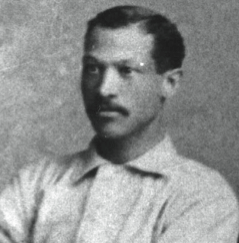George Stovey (George Washington Stovey)

In 1907, black player-turned-sportswriter Sol White alluded to a supposed effort in 1887 by New York to sign George Stovey. White, writing in a baseball book bearing his name, stated that “arrangements were about completed for his transfer from the Newark club, when a brawl was heard from Chicago to New York. Cap Anson, with all the venom of hate which would be worthy of a (Benjamin) Tillman or a (James) Vardaman of the present day, made strenuous and fruitful opposition to any proposition looking to the admittance of a colored man in the National League.” In prefacing his story, White said, “Were it not for this same man Anson, there would have been a colored player in the National League in 1887.” However, there are other accounts from 1887 which seem to cast some doubt on the assertions of White that are detailed above, particularly concerning what role Cap Anson played in the controversy. On April 9, 1887, the Newark Journal said New York Giants manager Jim Mutrie offered to buy Stovey and teammate and fellow black Moses Fleetwood Walker, who were now both with Newark of the International League, “but [Newark] Manager [Charley] Hackett informed him they were not on [sic] sale.” The day before that report, Newark and New York had met at the Polo Grounds, and Stovey and Walker had played (New York Sun, April 8, 1887). Presumably, Mutrie made his offer after the seeing the game. If so, since a single day elapsed between the game and the offer’s rejection by Newark manager Hackett, it is highly unlikely that Anson, who was in St. Louis, would have weighed in.
In addition, George Stovey was part of a far more acute controversy leading up to the 1887 season. It involved Newark and Jersey City, and reveals that Newark had no interest in selling him during the period in which White blamed Anson. Anson and Stovey did cross paths later in 1887, when, according to contemporaneous reporting, on July 14, 1887, following a vote that morning by International League owners to approve no more contracts with black players, in a home exhibition game against Chicago that afternoon, Newark’s Stovey and fellow black teammate Walker sat out because of Anson’s objection. Both Stovey and Walker had played on July 11. The day of the Chicago game, the Newark News listed George Stovey as the scheduled pitcher. Then, in its recap, it said, “Stovey was to have pitched for Newark, but he complained of sickness, and so [Micky] [sic] Hughes was substituted.” Stovey did not play again until July 17, and Walker not until July 26. (Newark Journal, July 12 to July 27, 1887; Newark News, July 14–15, 1887.) A few days after the game with Chicago, the Newark Sunday Call said, “Stovey was expected to pitch in the Chicago game. It was announced on the ground [sic] that he was sulking, but it has since been given out that Anson objected to a colored man playing. If this be true, and the crowd had known it, Mr. Anson would have received hisses instead of the applause that was given him when he first stepped to the bat.(Newark Sunday Call, July 17, 1887; New York Telegram, July 18, 1887.) In 1889 he pitched for both the Cuban Giants, based at Trenton, New Jersey, and the New York Gorhams, based in Philadelphia. In 1891 he played for the Cuban Giants at Ansonia. These were all-black teams playing in organized baseball in those two seasons. He also played some in the outfield, batting .256 in a total of 122 games.
Born
- May, 01, 1866
- USA
- Williamsport, Pennsylvania
Died
- March, 22, 1936
- USA
- Williamsport, Pennsylvania
Cemetery
- Wildwood Cemetery
- Williamsport, Pennsylvania
- USA

